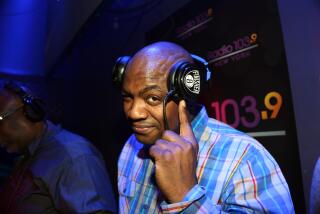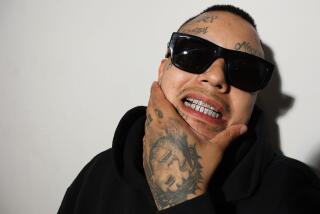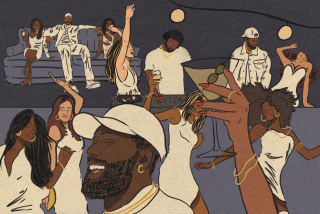His rep got a bad rap
IN the opening chapter of Jerry Heller’s new memoir “Ruthless,” the most pilloried music executive in hip-hop history acknowledges his controversial reputation by beating his detractors to the punch. He quotes various disses aimed at him by a who’s who of gangsta rappers, including Snoop Dogg, Ice Cube and the Game. “I met Jerry Heller once and just didn’t trust him,” trumpets a blurb from Ice-T on the book’s back cover.
Heller, who as a booking agent has represented Elton John, Van Morrison, Marvin Gaye and Pink Floyd among many others, helped Compton entrepreneur Eric “Eazy-E” Wright get his Ruthless Records off the ground in 1987, ushering in a cultural revolution with the launch of the incendiary rap quintet, N.W.A
The group’s ribald songs about street violence, police brutality and roiling race relations became the soundtrack of underclass rage and desperation -- selling millions of records and placing Heller among the era’s most successful executives in the process.
But when O’Shea “Ice Cube” Jackson, N.W.A’s primary writer, and Andre “Dr. Dre” Young, its musical architect, quit the group, they vilified Heller as a money-grubbing manipulator who bilked them out of their earnings -- a reputation that dogs Heller to this day.
Now, with “Ruthless,” the 65-year-old Cleveland native is striking back at everyone who has badmouthed him by rewriting rap history.
“Ruthless” begins with rappers assassinating your character. Why start out that way?
If you tell other than the truth, nobody will believe you. And if you discredit yourself early on in the book, people will think, “Why would he lie about this?” Later, when I go into my vicious attack on Ice Cube, they then think: “He told the truth all along.”
Cube gets some choice descriptions: “borderline paranoiac,” “momma’s boy,” “women wouldn’t give him the time of day.”
Cube stabbed Eazy and Ruthless in the back. Eazy gave him the chance to be what he’s become. And he said some things that are absolutely untrue. But I’ve always said that my problems with Ice Cube were mathematics, not semantics.
He has alleged that you exploited him and manipulated Eazy and has been especially bilious about your race and religion. How did those issues get conflated with what you describe as a contractual dispute?
Cube not only attacked me as a man, but as a Jewish man. He did it to further his own career -- to justify getting up and walking away from Ruthless. He takes a very traditional position: In the old days of the music business, the mob guys that ran it exploited black artists. I told Eazy starting out, “This is going to be a black-owned company. We are not going to fall into that traditional stereotype.” We didn’t, but got blamed for it anyway.
That was in 1990. Why didn’t you defend yourself at the time?
It was a combination of arrogance and naivete on my part. “No one will ever believe that about Jerry Heller. I’m on top of stuff. I’m the guy that says Berry Gordy is the premier genius of our business!”
Cube’s dis track, “No Vaseline,” was the first to savagely put down a music industry executive -- you. How do you feel about that part of your legacy?Is Ice Cube a brilliant lyricist? Sure. Would people have ever heard of him if it weren’t for me? Maybe, maybe not. I made him the poet laureate of the rap era. He wrote the greatest dis song in history. If it wasn’t about me, I would have said, “Wow. This is a great song!”
Dr. Dre took his attack on you even further, hiring some sleazy bozo to satirize you in his video for “Wit Dre Day.” Why be so hard on Cube and not Dre?
When that came out in 1992, he had been with me on a daily basis for five or six years. If that’s what Dre wanted to say, he earned the right. We lived next door to each other in two different houses. Do I think it’s right? No. But I didn’t take it as personally.
You could take credit for establishing Dre as well.
I’ve always felt that Dre leaving Ruthless was my failure, not Eazy’s. Eazy paid me a lot of money to look after his assets. I never thought anyone could come between Dre and Eazy. These guys were as tight as any two human beings could be. I could never envision someone like [Death Row Records co-founder] Suge Knight coming between them.
What would you have done differently?I talked to Eazy several times about making Dre a full partner in Ruthless. He said, “It’s not in the cards.” So I wanted to give Dre his own label. He would own 100% of this company that was going to be called Def Row. Eazy and I would earn 10% each on commission. I had a $20-million deal for Dre with $12 million up front -- a huge deal that came along just at the time [the controversial Ice-T song] “Cop Killer” came out. That killed the deal.
You say you pushed him to take an 80% ownership stake in Ruthless, assuming a managerial role when he wanted to make you a partner. What was the power dynamic between you two?He was very Machiavellian, nobody pushed him to do anything he didn’t want to do. He was very smart. Sometimes white people underestimate dark-skinned black people. Eazy-E was one of the smartest guys I have ever known.
Yet in “Ruthless,” you describe yourself variously as his “superbodyguard” and your job as being to “protect and serve” him. You realize that sounds paternalistic and somewhat condescending, right?I felt father-son with Eazy and with Dre. It was a father-son relationship. But with Cube and Dre, here’s what changed: They grew up from being little boys to being men. They went from being poor to rich. They had their own people around them. And it became clear that I was Eazy’s guy. That gave fertile ground for the seeds of discontent to grow.
You’re trying to get an Eazy-E biopic made. What’s its status?
The funding from foreign investors is in place. I just hired a director, George Hickenlooper -- he’s in post-production on “Factory Girl” and directed “The Mayor of the Sunset Strip.” We’re making offers to actors now. I’d like Larenz Tate to play Eazy. I’d like Terrence Howard to play Dr. Dre. And I would like the Game to play Suge Knight.
But the Game is one of the rappers who has put you down; he warns unnamed others against “Jerry Heller-in’ ” him in one song.I confronted him about that in a chance meeting. He said, “I thought it was a compliment.”
How important is it to rehab this impression of you as a manipulative scoundrel just as the movie is gaining momentum?It’s my job to protect Eazy’s legacy. Here’s Tupac and Biggie who have become bigger than life and Eazy has become an afterthought. But also, I always thought that someday I’d have the chance to tell people the real story. I didn’t mind waiting.
You begrudge Suge Knight for breaking up N.W.A. Now he’s in bankruptcy proceedings and on the verge of losing Death Row. What do you make of that?
I don’t want to be judged next to guys like Suge Knight. I want to be measured next to David Geffen, Irving Azoff and Clive Davis. Whether I measure up or not, I let my record speak for me. That’s how I want to be judged -- by what I’ve done. Not by what people like Ice Cube and Dr. Dre have said about me.
More to Read
Start your day right
Sign up for Essential California for news, features and recommendations from the L.A. Times and beyond in your inbox six days a week.
You may occasionally receive promotional content from the Los Angeles Times.







